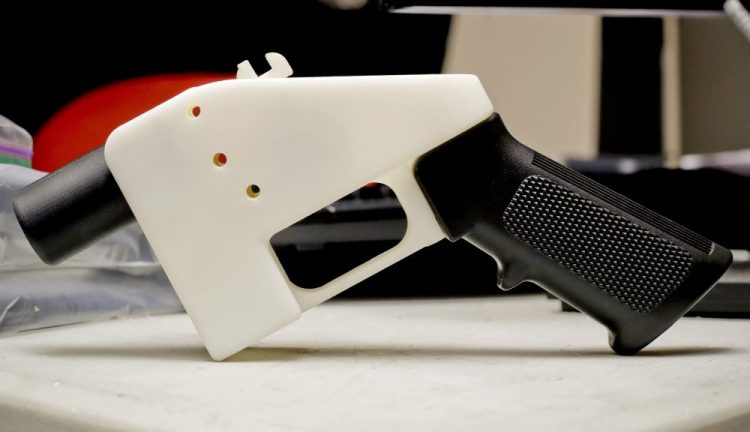The Maine Attorney General’s Office has joined a multi-state federal lawsuit against the Trump administration, asking courts to block a ruling that would put the regulation of 3-D printed firearms in the domain of the U.S. Department of Commerce.
The guns, which can be printed from files downloaded from the internet, are now regulated by the State Department.
Advocates for stronger gun regulation in Maine praised Attorney General Aaron Frey’s decision to join 19 other states in the suit.
“This rule would put all Mainers at risk by allowing those legally prohibited from possessing a firearm to manufacture their own with a few clicks of a mouse,” Maine Gun Safety Coalition Executive Director Geoff Bickford said in a prepared statement. “This is irresponsible, dangerous and completely misguided.”
Marc Malon, a spokesman for Frey, did not respond to a request for an interview with Frey about Maine’s involvement in the suit.
The weapons raise concerns because they can be made by just about anyone with a computer and a 3-D printer. Because the guns are all or nearly all plastic, they are easier to hide from common metal-detecting security systems.
Federal law has required that plans for 3-D guns must include the installation of metal plates to ensure the weapons can be detected.
At least five states have passed laws to regulate the manufacture of homemade 3-D guns – California, Connecticut, New Jersey, New York and Washington, according to the Giffords Law Center to Prevent Gun Violence. Maine lawmakers haven’t passed any measures to regulate 3-D firearms.
The federal Undetectable Firearms Act of 1988 requires that all firearms be detectable by metal detectors, “after removal of grips, stocks, and magazines.” The law also requires that all major components of firearms, including “the barrel, the slide or cylinder, or the frame or receiver” be detectable by X-ray machines.
The act was supported by the National Rifle Association, which issued a statement Tuesday through its legislative arm.
“Many anti-gun politicians and members of the media have wrongly claimed that 3-D printing technology will allow for the production and widespread proliferation of undetectable plastic firearms,” said Chris W. Cox, of the NRA’s Institute for Legislative Action. “Regardless of what a person may be able to publish on the Internet, undetectable plastic guns have been illegal for 30 years.”
The Trump administration rule change would shift regulation of the transfer of the data files needed to print the weapons from the State Department to the Department of Commerce.
The controversy over the release of 3-D printed gun data largely started in June 2018, when Defense Distributed of Austin, Texas, reached a settlement with the federal government to allow it to make plans for the guns available for download.
But another federal judge in Seattle issued a temporary restraining order to stop the release of blueprints, and a coalition of 20 state attorneys general later filed a motion to continue to block the release of the plans.
In November 2019, U.S. District Judge Robert Lasnik agreed with Washington and 18 other states that the way the U.S. State Department tried to lift the ban on internet sales of the plans was arbitrary, not supported by evidence and a violation of the federal Administrative Procedures Act, according to a report in the Spokane, Washington-based Spokesman-Review newspaper.
The federal act governs the steps an agency must take when changing rules.
“The agency has simply abandoned, without acknowledgment or analysis, its previous position” that 3D-printed weapons posed unique threats to world peace, national security and foreign policy, the judge wrote. “Because it is arbitrary and capricious to ignore the contradiction in these circumstances, the agency action must be invalidated.”
Although concerns that the guns are undetectable have played a key role in the debate, Federal Transportation Security Administration screeners have also been able to detect the firearms on multiple occasions, confiscating them from passengers attempting to bring them on commercial airliners.
Like all firearms, explosives and replica weapons, 3-D-printed guns are prohibited in the cabins of commercial planes. Passengers caught trying to bring any weapons onto a flight are turned over to local law enforcement for prosecution.
Send questions/comments to the editors.




Success. Please wait for the page to reload. If the page does not reload within 5 seconds, please refresh the page.
Enter your email and password to access comments.
Hi, to comment on stories you must . This profile is in addition to your subscription and website login.
Already have a commenting profile? .
Invalid username/password.
Please check your email to confirm and complete your registration.
Only subscribers are eligible to post comments. Please subscribe or login first for digital access. Here’s why.
Use the form below to reset your password. When you've submitted your account email, we will send an email with a reset code.